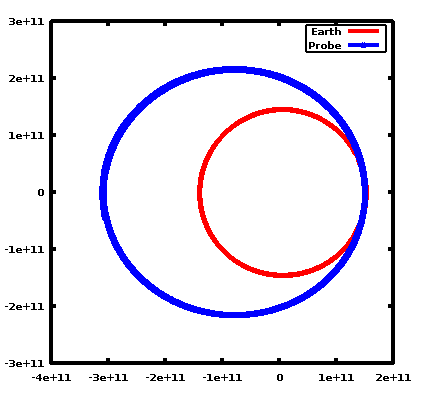[Date Prev][Date Next][Thread Prev][Thread Next][Date Index][Thread Index]
Re: Octave-maintainers Digest, Vol 84, Issue 59
|
From: |
c. |
|
Subject: |
Re: Octave-maintainers Digest, Vol 84, Issue 59 |
|
Date: |
Sat, 23 Mar 2013 16:39:43 +0100 |
This discussion is better suited for the help mailing list, so I am moving it
there.
On 23 Mar 2013, at 15:14, address@hidden wrote:
> First, it is very likely that the equation you are solving is sensitive
> to floating point errors. That is to say, a small numerical difference
> (maybe in the last bit of the mantissa) might later on be greatly
> exaggerated. This is a well known phenomenon in solving ordinary
> differential equations (ODE), and it would be hard to say which, if any,
> is giving the correct answer - MATLAB or octave. Another equation which
> illustrates this more profoundly is the famous Lorenz attractor
> http://en.wikipedia.org/wiki/Lorenz_system
> Secondly, your method of solving the (ODE) appears to be the so called
> Euler Method http://en.wikipedia.org/wiki/Euler_method. It is well
> known to be rather inaccurate (hence your need for a very small time
> step). Both octave and matlab have much more sophisticated ODE solvers,
> called lsode and ode45 respectively. Or if you want to write your own
> solver, I would suggest the Runge-Kutta Method of order 4 with a fixed
> step size http://mathworld.wolfram.com/Runge-KuttaMethod.html. It is
> actually fairly straightforward to program, and it will give far more
> accurate answers than your program.
This case is a long-time simulation of an Hamiltonian system.
Rather than a standard high-order explicit solver like RK45 an explicit
symplectic integrator is more appropriate for this problem.
I have an half-finished implementation of the velocity-verlet method which is a
second
order symplectic integrator, here is an example of how to use to solve the OP's
problem.
This integrator needs a bit more polishing and documentation, it will probably
be included
in the next release of odepkg.
c.

 Orbit11.m
Orbit11.m
Description: Binary data
 Orbit11b.m
Orbit11b.m
Description: Binary data
 velocity_verlet.m
velocity_verlet.m
Description: Binary data
| [Prev in Thread] |
Current Thread |
[Next in Thread] |
- Re: Octave-maintainers Digest, Vol 84, Issue 59,
c. <=

![]() Orbit11.m
Orbit11.m![]() Orbit11b.m
Orbit11b.m![]() velocity_verlet.m
velocity_verlet.m